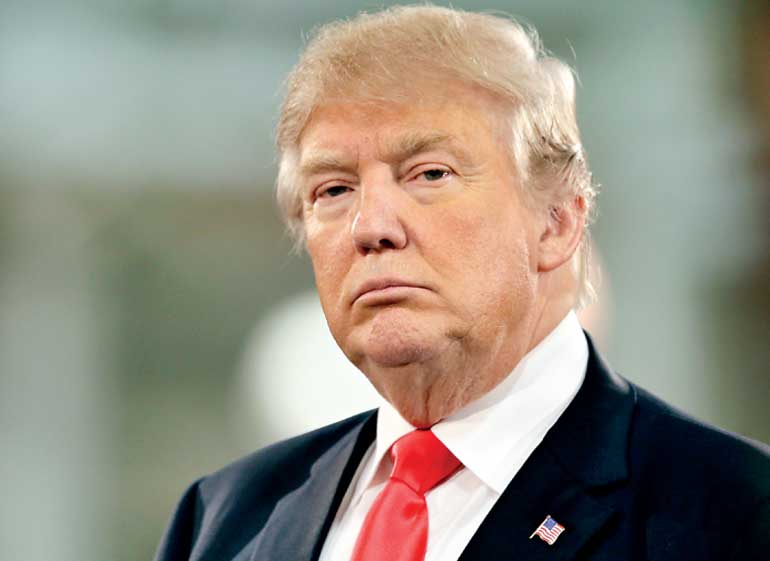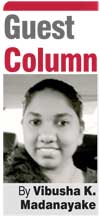Thursday Feb 19, 2026
Thursday Feb 19, 2026
Wednesday, 22 March 2017 00:03 - - {{hitsCtrl.values.hits}}
“From this day forward, a new vision will govern our land. From this day forward, it’s going to be only America first, America first” - US President Donald Trump
The above statement was declared by new American President Donald Trump in his inauguration speech on 20 January 2017. President Trump became famous even before his appointment as President for his numerous controversial statements on Islamic fundamentalism, his immigration policy and views on China and Russia. In the end, President Trump took office with an agenda that marks a radical break from the past.
 US President Donald Trump
US President Donald Trump
Although it is too early to predict the prospects of Trump’s new foreign policy, we can make an effort to examine his foreign policy in regard to the developing world. It is understandable that the arrival of a nationalist leader might be a radical break for the US after having a number of liberal-centered presidents.
The ‘America First’ ideology of the President Trump reflects the new concept of ‘Responsible Nationalism’ in politics and international relations. Charles W. Eliot stated that Responsible Nationalism was “when countries are expected to pursue their citizens’ economic welfare as a primary objective but where their ability to harm the interests of citizens elsewhere is circumscribed.” (Summers, 2016)
He further stressed that international agreements would be judged not by how much is harmonised or by how many barriers are torn down but whether citizens are empowered. When analysing Trump’s statements, it is crystal clear that Trump has the ethics of responsible nationalism with his ‘America First’ ideology. In his inaugural speech, he stated that “every decision on trade, on taxes, on immigration, on foreign affairs will be made to benefit American workers and American families.” This manifests the urge of Trump to empower the American people.
Trump’s argument on international trade agreements and the country’s competitiveness gave an impression to the world that he would push for radical change with reference to trade. He was very open about his future trade relations with China. Once he emphasised that he would get tough with China and withdraw from the 12-nation Trans-Pacific Partnership (TPP) which is still not finalised.
Basically, Trump is of the opinion that the United States is a victim of free trade, which he blames for the decline of US economic competitiveness, the shrinking of the middle class and an insufficient employment rate. He also stressed that “NAFTA has been a total disaster for the US and has emptied our states of our manufacturing and our jobs” and he further stated that he would not hesitate to launch a trade war, especially against China, to change this current situation.
During his election campaign, Trump pledged to build tariff barriers in order to protect American economic and trade interests. Therefore, it is justifiable to predict that the world will be able to see a more aggressive policy for trade protectionism under Trump’s administration such as many tariffs, trade sanctions and policies. This situation definitely affects the developing world, especially those countries conducting trade relations with the US and China.
The actions of Trump regarding immigration and security policies caused many verbal spats during the past few weeks. Trump’s promise to build an “impenetrable physical wall” across the US’ southern border commenced in his first week in office. On the other hand, Trump’s administration has pledged to pursue a temporary ban on migration from regions which he assumes to be exporters of terrorism.
These decisions of Trump are definitely going to create major havoc. If Trump tries to slap trade or political sanctions on select countries, it is expected that the rest of the world also will have to be biased at least in some respects in order to have good relations with Trump. This situation might badly affect the developing world and its future. For countries like Sri Lanka, it is essential to have balanced relations with everyone. Therefore, this situation might be unhealthy for the current world order.
President Trump is a realist, believing power to be the only law of international relations. He proved this with his strategy for Russia and China, to improve relations from a “position of strength”.
He further emphasised that he would expand America’s military spending and strengthen the military within the coming years. From this perspective, Trump gave the impression that he would not hesitate to use military power when there was no alternative.
Trump’s views on the United Nations are also controversial. The United Nations is the world’s largest mechanism to promote international cooperation with nearly 193 member states. Whatever the weaknesses of the UN, three-fourths of the world still accepts it as the only mechanism to encourage diplomacy and peace between states. But President Trump has criticised and questioned the UN’s existence most of the time.
He once stated that “it is just a club for people to get together, talk and have a good time.” “As to the UN, things will be different after 20 January,” he added.
These statements gave an impression that the new environment he created is filled with uncertainty.
The developing world will have to follow this situation with the UN carefully since those are the countries which will be most affected by immediate changes. On the other hand, Donald Trump has appointed a new ambassador to the UN, Nikki Haley. This appointment and its nature will decide the future of the developing world in the coming years. In this regard, the importance of the new appointment and the way she is going to handle the UN will be noteworthy.
As the last point, the nepotism policy of Trump also can be counted as his new tendency. Jared Kushner, the husband of President Trump’s eldest daughter Ivanka, is a 36-year-old adherent of Judaism who is currently playing a major role in White House politics.
He was the only family member among the small group of advisers which accompanied Trump on his first visit to the White House. Although Kushner has no administrative or political experience, his devotion and loyalty to his father-in-law was praised by President Trump several times.
Prof. Swaran Singh in his latest paper article in the Indian New Express states: “The New York Times has already crowned Ivanka as the most influential first daughter since Alice Roosevelt Longworth and with Kushner, the two are set to become the most  powerful couple in Washington circles.”
powerful couple in Washington circles.”
Currently Kushner acts as a senior White House adviser together with Chief of Staff Reince Priebus and Chief Strategist Steve Bannon. Kushner’s appointment was questioned on the basis of a 1967 anti-nepotism law in the United States. But the US Department of Justice issued an opinion stating: “The President may appoint relatives to his immediate staff of advisors.”
On 20 January 2017, Trump was inaugurated as the US President and Kushner was sworn in on 22 January 2017. He was among the senior advisors of Trump’s presidential campaign too and it was reported that that he played a major role in developing Trump’s digital media strategy.
When considering the recent appointments to the White House, it is reported that Kushner had persuaded Trump to fire his campaign manager Corey Lewandowski and later advised him to pick Reince Preibus as the White House Chief of Staff.
Although Chris Christie was being considered for the role of Trump’s running mate, Kushner disapproved of it and made sure Mike Pence was picked. Chris later took charge of Trump’s transition team but Kushner again ensured his exit. Recently, Trump has named Reed Cordish, Kushner’s friend, as assistant to the president for intra-governmental and technology initiatives, according to Prof. Singh.
It is very interesting to note the way President Trump changed current laws and proceedings according to his personal interests while being a nationalist. Recently, President Trump put Kushner in charge of brokering peace in the Israeli-Palestinian conflict as well as making deals with foreign countries. It is clear when observing the current state of affairs at the White House that most of the prospects and policies of Trump are closely connected to his personal interests, beliefs and relations.
However, the world has more time to reach conclusions, rather than making assumptions, about President Trump’s foreign policy. President Trump himself needs more time and experience to think about a new security and foreign policy for the US. Therefore, there is hope that the world will see more interesting twists and turns in US politics in the coming years.